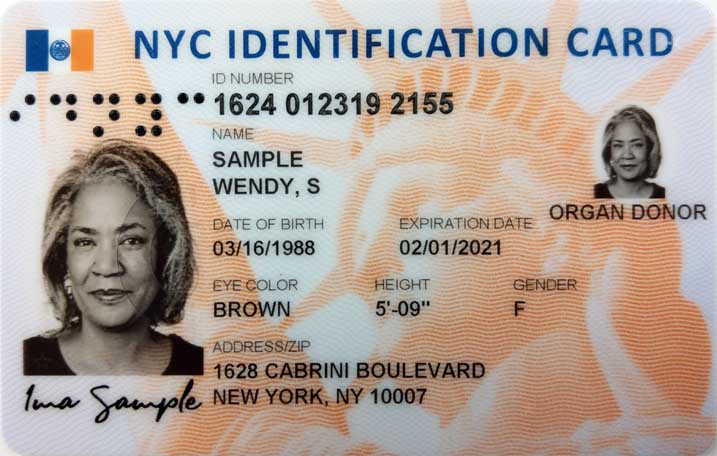City ID and the Right to Travel
In recent overviews, we’ve discussed the barriers to getting a passport or state-issued driver’s license or ID card (especially in states that have chosen to participate in the national REAL-ID system and database) and the difficulties faced by travelers without ID.
Some cities, notably including New York and San Francisco, have attempted to mitigate the discrimination against their residents who are unable to get Federal or state ID by issuing municipal ID cards.
How useful are these city IDs for travelers without other ID? Do they solve the problem of demands by common carriers for ID to travel by bus, train, or plane?
The short answer is that these city ID cards succeed in mitigating the damage that results from demands for ID to travel, but they aren’t a real solution to the problem.
Here’s what happens if you want to travel with a city ID:
To use a city ID to travel or for any other purpose, you first have to get a city ID. The prerequisites are designed to be easier to meet than those for passports or state-issued IDs, especially for asylum seekers or unhoused people who may not be able to provide as much other official documentation of their identity and status. By design, a larger range of documents are accepted in support of an application for a city ID card than would be required for a passport or state ID. But to get a city ID card you still have to show some other official documentation of your identity and your place of residence in the city.
If all your papers are lost or stolen while you are fleeing persecution or living on the streets, and you can’t readily get them replaced (perhaps because the originals were issued by a government entity that no longer exists, whose records weren’t preserved, or that won’t provide you with copies for the same reasons you fled its territory and sought asylum in the US), there’s no clear pathway to “bootstrapping” new ID. Witness testimony won’t suffice, even if you have friends who have papers and are willing to vouch for who you are.
If you can get a city ID, it satisfies Amtrak’s conditions of carriage, and instructions to staff, which explicitly mention IDs issued by city or county governments.
The following forms of identification are acceptable for persons 18 and older:
One piece of photo identification issued by a government authority,…
Examples of acceptable forms of ID include:
Official government-issued identification (federal, state, city or county government or foreign government)
Activist Post is Google-Free — We Need Your Support
Contribute Just $1 Per Month at Patreon or SubscribeStar
For what it’s worth, a public library card or an ID issued for any purpose by any local government agency also appears to satisfy Amtrak’s ID requirements, as long as it has your photograph on it.
It’s a little less clear, but we suspect that a city ID will be accepted for travel on Flix Bus USA (Greyhound). Flix Bus USA and Greyhound require all passengers to “produce positive identification” on request, but don’t define “positive identification”. We’d welcome feedback from travelers who’ve tried to buy tickets and travel on Flix Bus USA routes, including routes operated in the name of Greyhound, using city IDs.
If you try to fly with a city ID, the TSA will treat it as “unacceptable identification” . That doesn’t mean that the TSA won’t let you fly. Thousands of people without “acceptable” ID, including many with no ID, fly every day in the USA. But without “acceptable” ID, you’ll be subjected to additional interrogation and a more intrusive groping of your body and search of your luggage.
The TSA might let you through its checkpoint if you show a city ID (with a photo) and a second piece of “unacceptable” ID with your name on it, even one without a photo. Or the TSA might arbitrarily decide to make you play a game of 20 questions to see if what you say about yourself matches what the commercial data broker Accurint has in its “garbage in, garbage out” aggregated files of unverified information and misinformation about you.
If Accurint doesn’t have a file about you — perhaps because you are new to the US or have been living an undocumented life — you might not be allowed to fly. We’d be interested in hearing from people who have not been allowed to fly despite cooperating with the TSA.
Long-distance travelers in the US with city IDs are, in practice, treated as second-class travelers, like those disfavored citizens of China with low “social credit” scores who are allowed to travel only by bus or slow train, and not by plane or high-speed train.
Despite these limitations, there are reasons you might want to use a city ID, when you can, even if you have or could get a passport, passport card, driver’s license, or state ID.
Most city IDs, including those issued by New York City and San Francisco, don’t have a barcode or magnetic stripe (like a driver’s license or state ID), OCR text designed to be machine readable (like a passport), or an RFID chip (like a passport or passport card). This makes it more slower and more obvious if your use of that ID card is being logged.
All-purpose ID is touted as a convenience, but it’s also an enabler for one-stop surveillance and one-stop identity theft. Having many IDs for different purposes makes surveillance and tracking at least somewhat more difficult.
A city ID number is less likely than a passport, driver’s license, or state ID number to be included in other government or commercial databases (like that of Accurint). When, where, to whom, and for what purposes you show a city ID card may be less likely to be correlated with or added to the transaction, location, and event logs in these databases.
Unlike state and Federal ID systems designed for data sharing, city ID programs have typically been designed, to the extent possible, to protect card holders’ privacy. The application form for a San Francisco ID card is typical:
The City will keep information provided with this application confidential to the extent permitted by law, but the City cannot guarantee its privacy in all circumstances. Such information may be subject to release if compelled by a court of competent jurisdiction or otherwise required by law.
The limited ability of city governments to protect the privacy of city ID card data is just one of many signs that the fundamental problem lies not in ID card issuance schemes but in the demands to “show your papers” to travel or engage in other activities of daily life.
In the context of pervasive ID demands, ID-linked controls, and ID-linked event and location logging, city IDs are one small, positive, step toward disaggregated ID.
But city-issued ID cards can’t solve the problem of unjustified ID demands.
The answer lies not in “ID for all” but in the right to travel without ID.
You need a license to drive a motor vehicle on public roads, but you don’t need a license to travel as a passenger in a car driven by someone else or in a bus, train, plane, or other common carrier. If you don’t need to prove that you have a license, you shouldn’t have to prove that you have ID at all.
Alongside damage-mitigation schemes like city ID cards, local officials and anyone who supports the right to travel should be working for Federal legislation like the Freedom to Travel Act to guarantee everyone — not just New Yorkers and San Franciscans — the right to travel throughout the US without their movements being tracked and controlled.
Source: PapersPlease.org
Become a Patron!
Or support us at SubscribeStar
Donate cryptocurrency HERE
Subscribe to Activist Post for truth, peace, and freedom news. Follow us on SoMee, Telegram, HIVE, Minds, MeWe, Twitter – X, Gab, and What Really Happened.
Provide, Protect and Profit from what’s coming! Get a free issue of Counter Markets today.




